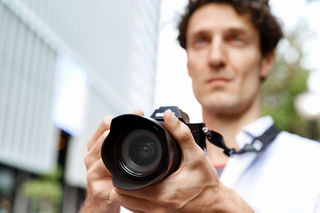Why Celebrities Should Not Allow "Selfies" With Fans.
Why Celebrities Should Not Allow "Selfies" With Fans
How a stalker can put you in danger.

Source: Sergey Nivens/Shutterstock
Emma Watson has a new movie coming out, so she’s making the obligatory media rounds to promote it. In a Vanity Fair interview, she mentioned that she does not allow fans to take “selfies” with her. Possibly her security staff has warned her about this, and probably her own experience with intrusive fans has taught her to set boundaries.
As Watson points out, a selfie posted on Facebook establishes her location “within 10 meters.” This is a gift to stalkers, who can range from harmless to psychotically violent. During the Reagan administration, the late NBC News anchor Jessica Savitch was stalked by a man who wrote her that he was going to kill Vice President Bush or Secretary of State Haig to impress her. One day, he sneaked past security and entered Savitch’s office. When she realized who he was, she feigned delight at meeting him — long enough to get by him and out the door.
Being famous practically guarantees that one will have stalkers. It’s so common among people in the public eye that a significant body of research exists from which to detect some patterns:
- Both males and females engage in stalking. Stalkers may fixate on current and former lovers, strangers, celebrities, or politicians. Female stalkers are more likely to target celebrities than any other group, but celebrity stalkers are still predominantly males stalking famous women.
- “Approach behavior” is key to predicting abusive or even violent behavior. However, far more people approach celebrities in person (i.e., directly) than communicate with them via phone, mail, or email (i.e., indirectly). And more people approach celebrities indirectly than commit criminal acts against them. So the challenge is identifying which of the many thousands of direct and indirect approaches indicates an actual threat to the celebrity’s person or property. (Remember the woman who repeatedly broke into David Letterman’s home, claiming to be his wife?)
- Research by Dr. Park Dietz indicates that indirect approaches which contain hateful, threatening, or obscene material were unlikely to lead to any criminal acts. These stalkers seem more interested in insulting and shocking a target than in committing harmful acts. Many of these offensive communications are also anonymous, indicating that the sender fears exposing him or herself.
- Stalkers who contact their target multiple times using different communication methods (e.g., phone, mail, email) were more likely to approach directly and commit a criminal act. With each successive communication, the risk increases — up to the tenth communication. After that, the risk diminishes.
- Stalkers whose communications mentioned a desire to meet in person, and who have indicated a willingness to travel to such a meeting, were more likely to commit an offense. However, those who mentioned an unrealistic desire to have a relationship (or have children) with the victim were less of a risk.
- Stalkers who are socially isolated are at risk for committing criminal acts against their targets, but so are stalkers with grandiose, paranoid, or delusional personalities.
There is no black-and-white profile for celebrity stalkers, because so many people approach and communicate with them, and the vast majority are harmless. The warning signs mentioned above are not conclusive, because many people engage in those types of behaviors and yet never commit a crimeagainst their target. The best course of action for Watson, or anyone who needs to discourage a stalker, is to do just what she's doing: Set boundaries and avoid being too approachable and too vulnerable.







Comments